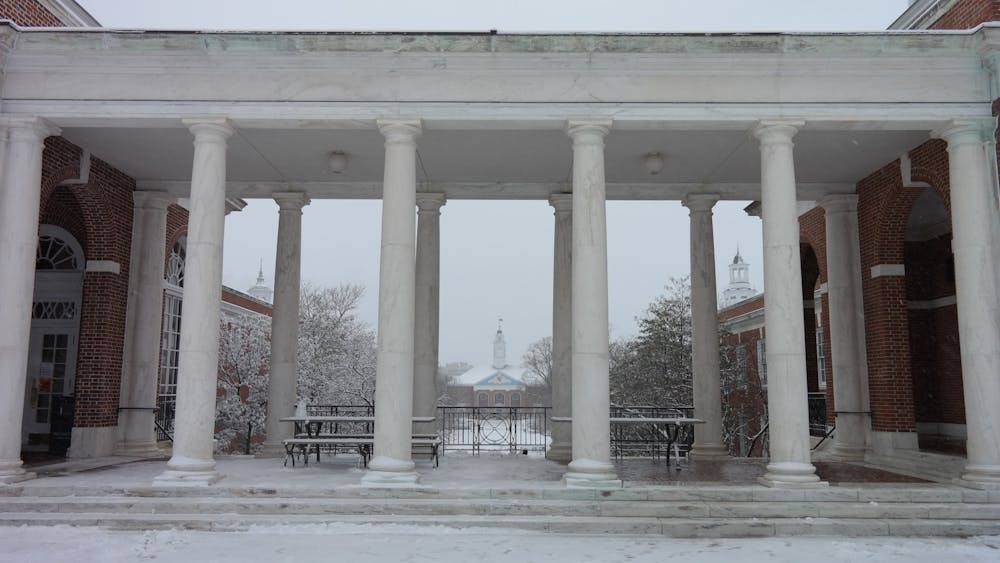The University announced it would form the Committee to Establish Principles on Naming last July as part of its Diversity and Inclusion initiative. The committee is charged with developing guidelines for the process of renaming and de-naming titles affiliated with Hopkins buildings, scholarships and programs, including names that may be tied to racism or inequality.
Over the past few months, the committee has hosted several listening sessions to engage with Hopkins community members in the process.
In an interview with The News-Letter, Committee Co-Chair and Vice Chair of the Board of Trustees Anthony Anderson (Class of 1976) detailed the group’s goal.
“Our committee is not responsible for addressing individual names. Our mandate is to come up with the principles that should be applied in the reconsideration of a name,“ he said.
Anderson emphasized that the committee’s focus is not to erase unfavorable parts of the University’s past but to address its missteps.
The committee has been focused on ensuring an inclusive and rigorous deliberation process. Its 22 members include University administrators, faculty, undergraduate students and graduate students. The group is divided into three subcommittees — process, criteria and contextualization — each tasked with compiling research towards a draft resolution.
Anderson highlighted that the previous listening sessions have produced many interesting ideas.
“One example of contextualization was using digital coding on buildings. With something like a QR code, we have the opportunity to provide some background and educational information for a person who was wondering why a building might be named in such a way,“ he said.
The committee hosted its sixth listening session on Feb. 8. Attendees were moved into Zoom breakout rooms to discuss how to implement procedures fairly and best assess benefit and harm for naming decisions.
Toby Gordon, an associate professor at the Carey Business School, argued that existing philosophies should guide the committee’s decision making.
“If we look at things like human research subjects’ protection and philosophies around not doing harm, there are existing frameworks to think about how we could possibly look at the impact of someone’s legacy. It’s not a black and white decision, [but] there’s already a framework,“ she said.
When discussing naming criteria, Dr. Charles Flexner, a professor at the School of Medicine, emphasized the importance of distinguishing between naming based on financial contributions and on direct contributions to the Hopkins community.
“I can understand the benefit of putting the name of a donor, but I can also see the benefit of naming things after people who are affiliated with our institution who might have [only] given their intellectual contributions, their cultural contributions [or] their social contributions,“ he said.
Flexner also argued that including a more diverse group of people in the deliberation process would enhance the committee’s ability to find solutions that incorporate a wider breadth of views.
Senior Lucas Miranda-Martinez pointed out that even with a more diverse cohort, it would be challenging to develop naming guidelines that are entirely inclusive.
“It’s hard determining who is affected by what and to what extent because undoubtedly some groups of people will get more affected. Maybe knowing that Johns Hopkins himself was a slave owner will affect descendants of slaves a lot more than people that aren’t,“ he said.
Miranda-Martinez added that the rapidly changing demographics at the University might also affect the impact of naming decisions and might add further complexity to the issue in the future.
Anderson said he welcomed these extensive debates and underscored how important they are to the committee.
“One of the things we have decided to do early on is to not draft a report until we have received the feedback from the listening sessions,” he said.
The committee has been in contact with similar groups at peer institutions, including Stanford, Yale, University of Virginia and Duke. Anderson said that by general consensus, listening processes are expected to be lengthy and intense.
Though optimistic, he believes that the committee will take a considerable amount of time to create its first draft resolution.
“We want to be informed, so it is more important that we write a report that we feel good about than it is that we write a report that is quick,“ Anderson said. “I anticipate that we will see the report this semester, but it obviously depends on the ability of the committee to reach a consensus.”





